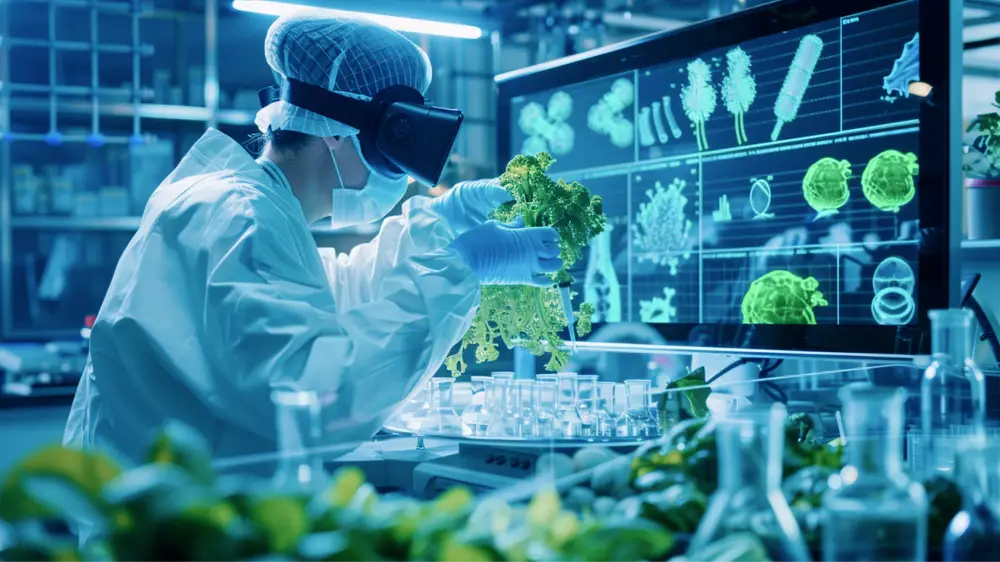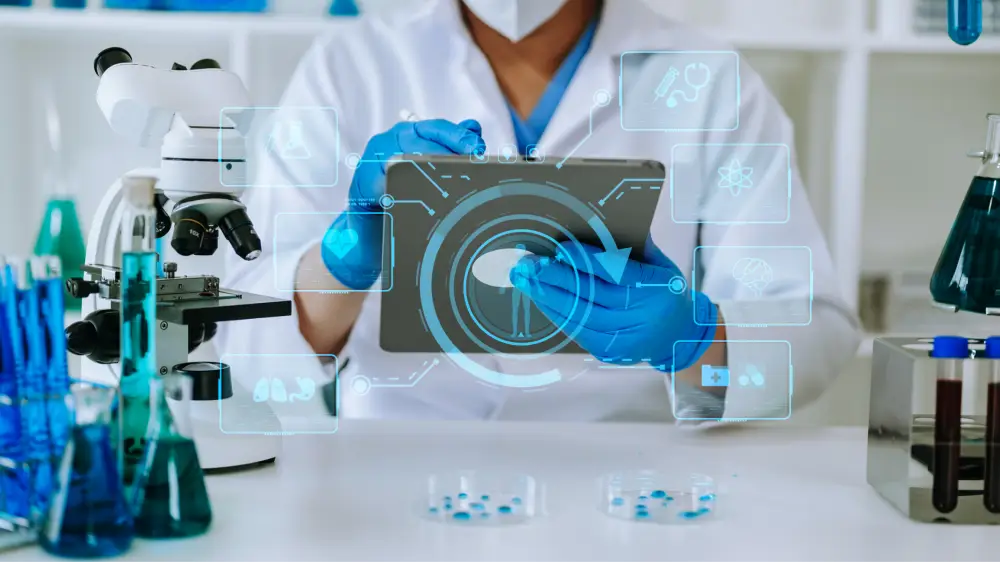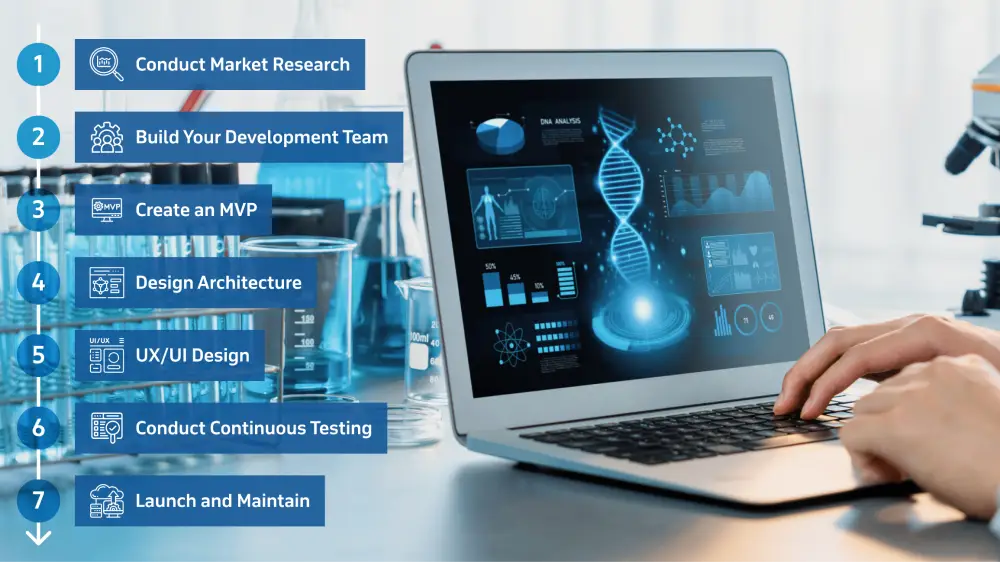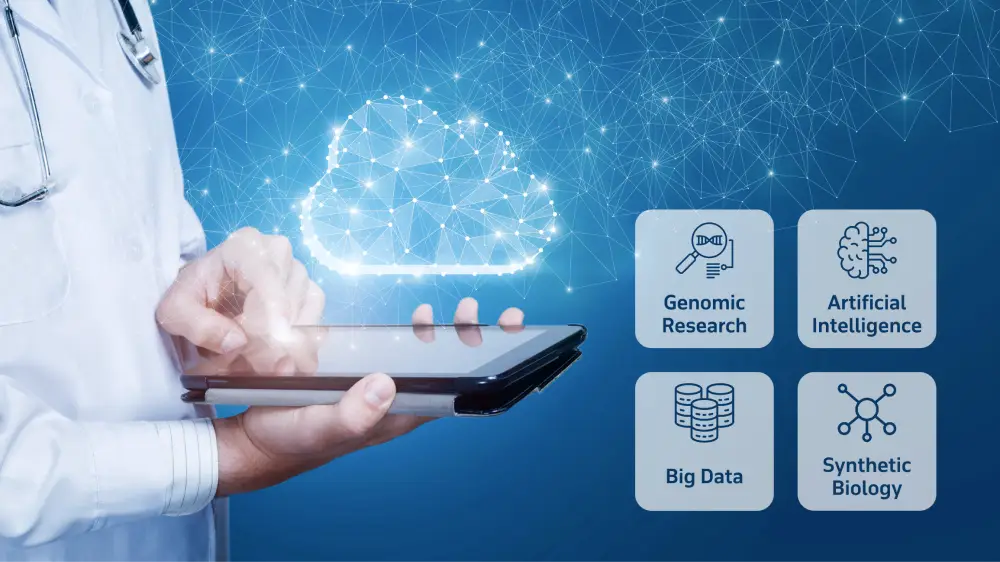In today’s data-driven era, biotech companies face growing challenges in analyzing massive genetic datasets and managing complex clinical trials. General-purpose tools often fall short, making biotech-specific software essential for achieving precision, compliance, and operational efficiency. These solutions empower life sciences companies to innovate confidently and tackle the industry’s unique demands.
The rapid adoption of such specialized tools underscores their importance, with the pharma and biotech CRM software market valued at $7.39 billion in 2024 and projected to double by 2028. Key drivers include the growing need for advanced analytics, diversified sales strategies, and a focus on delivering superior customer experiences.
In this guide, we’ll break down the key steps and strategies in biotech software development, providing a clear roadmap to help you navigate and succeed in this complex field.
What is biotech software?
Biotech software refers to specialized applications and systems designed to support and enhance biotechnology processes. These solutions are tailored to meet the unique needs of biotech companies, research labs, and clinical environments, enabling them to manage data, automate workflows, and model intricate biological processes with greater precision.
By integrating cloud-based platforms, biotech software offers robust storage and analytical capabilities to handle large volumes of data generated in biotechnology. Additionally, machine learning and big data analytics further enhance the software ecosystem by transforming complex datasets into valuable, actionable insights for researchers and developers.
Benefits of Biotech Software Development
The healthcare industry is experiencing a digital shift, giving both emerging startups and established biotech software companies strong incentives to invest in top-quality software.

Here’s what functional, well-designed biotech software can help you accomplish:
1. Fully embrace digital transformation
Biotech software development accelerates digital transformation by integrating EMR, EHR, HMS, and standards like FHIR. Improved interoperability and streamlined processes enhance data-driven decision-making, fostering innovation across the biotechnology sector. A unified digital ecosystem enables seamless communication and operational efficiency.
Adopting advanced systems supports every stage, from R&D to production and distribution. A robust digital pipeline ensures regulatory compliance and equips biotechnology companies to tackle evolving healthcare challenges, driving progress and maintaining a competitive edge in the industry.
2. Harness The Capabilities of AI and Machine Learning
Biotech software plays a critical role in enabling companies to harness the potential of AI and machine learning. Advanced platforms collect, organize, and manage vast amounts of research and clinical trial data, providing the structured foundation necessary for AI applications. By ensuring data quality and accessibility, software solutions create the conditions for AI to deliver impactful results.
AI-powered tools analyze curated data to uncover patterns, enhance accuracy, and automate complex tasks. Applications such as bioimaging, DNA sequencing, and protein modeling benefit significantly when paired with well-designed biotech software. The combination of robust software infrastructure and AI capabilities accelerates research processes, drives breakthroughs, and opens new avenues in biotechnology.
3. Reduce Costs
Biotech software development lowers operational expenses by reducing reliance on costly in-house IT infrastructure. Advanced systems streamline processes, automate routine tasks, and minimize hardware maintenance, significantly cutting long-term IT expenditures. Optimized operations free up resources, allowing companies to allocate budgets more effectively.
Leveraging external expertise or managed services enhances cost efficiency through competitive pricing and tailored solutions. Stabilizing IT budgets and reducing unexpected expenses enable organizations to prioritize innovation and research, fostering growth while maintaining financial stability.

4. Streamline Healthcare Delivery
Biotech software transforms healthcare delivery by automating administrative tasks like patient record management, lab testing, and medication tracking. Reducing human error and streamlining operations allows healthcare providers to allocate more time to patient care and improve overall efficiency. Integrating data from sources such as EHRs, lab results, and imaging systems enables professionals to access a comprehensive view of patient health.
By offering accurate and personalized treatment plans, biotech software supports better clinical decisions and outcomes. Predictive analytics further enhances care by identifying health risks and optimizing resource allocation. These capabilities empower healthcare teams to deliver effective, data-driven care, improving patient outcomes and operational workflows.
5. Enhance Compliance and Data Security
Biotech software development integrates regulatory compliance with robust data security. Advanced solutions align with standards from the FDA and EPA while safeguarding sensitive information like proprietary research and healthcare records. The approach reduces risks of penalties and breaches, enhancing operational efficiency and trust.
Automated compliance tracking and secure data tools keep companies aligned with evolving regulations while protecting critical assets. Features such as encryption, access controls, and real-time updates foster innovation without compromising integrity, creating a strong foundation for achieving research and business goals.
Key Types of Biotechnology Software
The software requirements of biotech companies can vary significantly based on their business models and specific areas of focus. Let’s explore the most common types of biotech software:

1. Pharmaceutical Software and Laboratory Information Systems (LIS)
In biotechnology, Laboratory Information Systems (LIS) and pharmaceutical software serve as essential pillars for managing complex lab and pharmaceutical workflows. LIS enhances laboratory operations by tracking samples, managing inventory, and automating experiments. By ensuring control over tools, processes, and personnel, LIS improves efficiency and allows researchers to maintain a focus on research.
Pharmaceutical software complements LIS by supporting drug development and manufacturing. Biotech ERP systems streamline tasks such as formulation, regulatory compliance, and quality control, reducing human error and improving accuracy. Together, both technologies create a robust infrastructure for managing research and production pipelines. For example, by automating regulatory compliance processes and optimizing resource allocation, these systems not only boost the speed of development but also help prevent costly delays and minimize wastage, ultimately improving the bottom line while maintaining high-quality standards.
2. Biotech ERP Systems
Biotech ERP systems provide biotechnology companies with a centralized platform to coordinate diverse business processes. By creating a unified data framework, these systems ensure consistent data formats across healthcare applications, enabling seamless communication and integration across different departments.
One significant advantage lies in enhancing supply chain management, as ERP systems enable real-time tracking of inventory and resources. Companies can proactively address shortages, minimize waste, and maintain smooth workflows for research and production. Another benefit is robust financial analytics, which helps organizations monitor budgets, uncover cost-saving opportunities, and ensure compliance with regulatory standards, driving greater efficiency across operations.
3. Biotech CRM and Clinical Trial Management Systems (CTMS)
Customer Relationship Management (CRM) systems are crucial for biotech companies looking to strengthen client relationships and improve communication. By providing detailed insights into the client base, CRMs enable more targeted sales strategies, enhance client retention, and support revenue growth.
When integrated with Clinical Trial Management Systems (CTMS), CRMs further enhance operational efficiency. CTMS solutions streamline the planning, tracking, and reporting of clinical trials while ensuring regulatory compliance. Together, these tools improve both client engagement and the management of clinical trial processes, driving success across various biotech operations.
4. Cloud-based Electronic Laboratory Notebooks (ELN)
Electronic Laboratory Notebooks (ELNs) replace traditional paper notebooks, allowing researchers to securely record, store, and manage experimental data. ELNs enhance data integrity and improve collaboration by providing easy access to real-time information, streamlining the research process.
Cloud-based ELNs offer even greater benefits, particularly for teams working across multiple locations. With cloud access, researchers can collaborate more efficiently, overcoming geographic barriers. Additionally, custom biotech software ensures scalability, providing the necessary computing power and storage capacity to support expanding research needs and modernize legacy systems.
5. Bioinformatics and data visualization tools
Bioimaging software plays a pivotal role in biotech research by interpreting visual data in real-time. Automated features, such as bone density analysis, spot detection, and time-lapse imaging, boost productivity by allowing researchers to focus on key insights rather than manual data processing.
Bioinformatics software complements bioimaging by analyzing complex biological data, including DNA sequencing, protein structure analysis, and genomics. With the integration of AI and machine learning, these tools enhance the accuracy and efficiency of data processing, enabling faster, more precise analysis of data from microscopy, spectroscopy, and other imaging techniques.
A Comprehensive Guide to Biotech Software Development
The journey to your final biotech software solution begins long before the first line of code is written, and can take weeks or even months to fully materialize. Here’s a step-by-step guide to navigate the development process and ensure success:

1. Conduct Market Research
Market research plays a crucial role in validating the demand for a biotech software solution. Conducting surveys and analyzing competitors provides valuable insights into market needs and preferences. Understanding these factors ensures the product addresses real-world problems, helping to build confidence with investors and stakeholders who seek solutions with proven market potential.
By identifying customer needs and industry trends, market research highlights gaps in current solutions. Recognizing these gaps helps align the product’s features with market demands, making it easier to attract investor interest and position the solution as an innovation in the biotech sector.
2. Build Your Development Team
Choosing the right development team is essential for the success of your biotech software project. Whether opting for outsourcing or building an in-house team, selecting professionals with biotech expertise and an understanding of industry-specific requirements is crucial.
Team alignment plays a key role in the development process. Align developers with your vision and work culture to create a collaborative environment that promotes seamless workflows and increases the chance of delivering a successful product.
3. Create an MVP
Developing a Minimum Viable Product (MVP) is crucial for testing a concept and collecting valuable user feedback. An MVP helps refine the product using real-world data, reducing risks and ensuring alignment with market expectations.
Iterative testing during the MVP process helps identify which features are most important to prioritize. Focusing on these features ensures the final solution delivers real value to end users, improving its chances of success in the market.
Read more: MVP: Get Your Game-Changing Healthcare Software to Market Fast
4. Design Architecture
Designing the architecture establishes the internal structure of the software and defines the relationships between its components. Crucial decisions include selecting cloud storage options and determining the appropriate tech stack for both backend and frontend development. These choices directly impact the software’s functionality and efficiency.
A trusted software partner plays a vital role in guiding these decisions. Their expertise ensures the architecture is built to support scalability, security, and high performance, addressing the specific needs of the biotech solution.
5. UX/UI Design
Focusing on user experience (UX) and interface design guarantees biotech software remains intuitive and easy to navigate. Prioritizing user-friendly layouts and workflows enhances usability, making interactions with the system more efficient.
Iterative testing and refining based on user feedback are key in this process. Continuous improvements help optimize the interface, ensuring it works seamlessly for users and increasing overall satisfaction and engagement.
6. Conduct Continuous Testing
Adopting agile development allows for quick testing, feedback gathering, and adjustments throughout the development process. Continuous testing enables the fine-tuning of features, issue resolution, and consistent product improvements with each iteration.
An iterative approach ensures the software evolves in response to user needs and integrates new insights. Over time, the product becomes more polished and effective, aligning better with user expectations and market demands.
7. Launch and Maintain
After completing testing and development, launch the software and ensure proper server setup for optimal performance. Provide onboarding support to users, making sure they can navigate and utilize the system effectively.
Following the launch, marketing campaigns can be initiated for commercial products, but ongoing maintenance should remain a priority. Regular updates and improvements are essential to adapt to evolving user needs, ensuring the software continues to deliver value and remains competitive in the market.
Trends in Biotechnology Software Development
Simply upgrading hardware no longer ensures better software performance. Today, cloud computing, microservices, and SaaS are leading the way. Here are five key technologies shaping the future of biotech software.

1. Genomic Research
Cloud platforms are transforming the way biotech companies handle genomic data by offering secure storage and seamless sharing capabilities. Researchers across various institutions can now collaborate on large-scale studies, particularly in genetic disorders and rare diseases. Moving genomic data to the cloud not only reduces research costs but also enhances data accessibility, fostering faster collaboration among global research teams.
For example, Seven Bridges Genomics enables biotech companies to analyze genomic data at scale through cloud-based computing. By simplifying complex bioinformatics tasks, the platform accelerates the discovery process, helping organizations identify genetic factors linked to diseases and optimize the efficiency of genetic research.
2. Artificial Intelligence
Artificial Intelligence (AI) is revolutionizing the biotech industry by improving efficiency and streamlining operations. By processing large volumes of biological data, AI uncovers patterns and biomarkers essential for drug discovery and diagnostics. AI algorithms can analyze datasets to identify potential drug targets and predict interactions with specific proteins, advancing the development of more effective treatments.
AI also plays a crucial role in medical imaging, where it aids in the early detection of diseases such as cancer. By analyzing abnormalities in cell structures or tissue samples, AI enhances diagnostic accuracy and speeds up the process. Additionally, AI supports agricultural research by detecting crop diseases and analyzing microbiomes, providing researchers with valuable insights for better decision-making across various sectors.
3. Big Data
The biotech industry now has access to vast amounts of data, driven by advancements in sensors, the Internet of Things (IoT), and electronic medical records. By harnessing big data, biotech companies can innovate and make more informed decisions. Integration of data from various sources, including clinical trials, patient records, and research studies, allows companies to identify trends, improve diagnostics, and develop new treatments.
Big data also plays a significant role in matching patients to clinical trials, opening up new avenues for treatment. The ability to analyze large datasets helps researchers uncover microbial patterns, enhance agricultural practices, and streamline clinical trial processes, ultimately advancing progress in multiple fields.
4. Synthetic Biology
Synthetic biology is rapidly advancing, merging biology, engineering, and technology to design new biological systems. Companies are leveraging this field to develop innovative solutions, including biofabricated electronic films and cell engineering therapies. One significant application is the creation of synthetic DNA, which is used in drug discovery, diagnostics, and other health-related areas.
Synthetic biology enables the creation of synthetic DNA on advanced substrates like silicon chips, supporting next-generation sequencing (NGS). Large-scale gene analysis helps identify disease-causing genes and accelerates drug development. As investments increase, synthetic biology is set to shape the future of healthcare, agriculture, and environmental science.
Common Challenges When Building Your Biotech Software
Creating biotech software means navigating a landscape where precision, regulation, and innovation intersect, demanding more than just technical expertise. Here’s what makes it uniquely challenging:
1. Lengthy Pipeline
Biotech drug development can take up to 14 years for FDA approval, involving intensive research, testing, and regulatory processes. This prolonged timeline strains financial resources as each phase demands significant investment, while patents risk expiring before the product reaches the market. The lack of early revenue adds further pressure, making funding continuity critical for survival.
To solve these challenges, biotech firms can adopt healthcare software that integrates data management, automates reporting, and enhances collaboration. Predictive analytics and AI-driven insights identify bottlenecks, optimize workflows, and shorten decision-making cycles. These solutions not only reduce development timelines but also improve financial planning and investor communication, ensuring sustainability.
2. Data Management
Biotech companies handle massive volumes of data stored across multiple systems, creating silos that obstruct access and integration. Fragmentation slows down decision-making and weakens collaboration between teams. Inconsistent data formats and poor quality often result in analytical errors, making standardization a pressing need. Without a seamless data flow, research and development efficiency suffers, jeopardizing the reliability of outcomes.
To solve data management challenges, implementing centralized platforms that unify data from various sources is essential. Standardizing data formats ensures consistency and reduces errors in analysis. Moreover, advanced tools like cloud-based solutions and data integration software facilitate real-time access, improving collaboration and accelerating decision-making.
3. FDA Approval
Securing FDA approval is one of the most significant obstacles in biotech, with a high attrition rate across development stages. Approximately 36% of candidates fail in early trials, and 60% don’t progress past intermediate phases, leaving many projects abandoned before commercialization. Despite the high costs and risks, the promise of market access and industry validation motivates companies to persevere.
Biotech firms can use AI and predictive analytics to refine candidate selection and trial design to improve success rates. Streamlined platforms for regulatory data management ensure compliance and reduce submission errors. By focusing on early-phase insights and efficient processes, companies can mitigate risks and enhance the probability of approval.
4. Healthcare Costs
Healthcare expenses place immense financial strain on biotech companies, with drug development averaging over $2.5 billion. Startups and smaller firms face significant barriers due to high development costs, stringent regulatory demands, and fierce market competition. Limited resources often hinder innovation and reduce market diversity.
Adopting AI-driven research and virtual clinical trials can significantly reduce development expenses. Forming strategic alliances with academic institutions or larger firms helps distribute financial burdens while fostering innovation. Streamlined processes and targeted investment in efficient technologies create opportunities for smaller companies to compete and thrive.
5. Cybersecurity
Biotech companies face significant cybersecurity risks as they increasingly rely on digital data. Clinical trials generate vast amounts of sensitive patient information, making them prime targets for data breaches. The financial repercussions of such breaches often exceed millions of dollars, eroding patient trust and jeopardizing operations. Protecting sensitive health data has become a critical priority in the digital age.
Implementing robust cybersecurity frameworks, such as end-to-end encryption and multi-factor authentication, helps protect sensitive data. Regular security audits and employee training minimize vulnerabilities while adopting advanced threat detection systems ensures timely responses to potential breaches.
Unlock the Potential of Biotech with KMS Healthcare’s Expert Software Solutions
Biotech software development is at the heart of the industry’s growth, enabling the acceleration of research, precision in drug development, and innovation in treatments. From handling large datasets to ensuring regulatory compliance, the right software can transform how biotech companies operate, innovate, and ultimately improve patient care. The demand for effective, scalable, and secure biotech software is higher than ever as the sector continues to evolve rapidly.
At KMS Healthcare, we specialize in providing the expertise and tailored solutions biotech companies need to overcome their unique challenges:
- Development Teams: Build strong, skilled development teams to bring your biotech software projects to life, delivering innovative and scalable solutions tailored to your requirements.
- Custom Software Solutions: Design and develop custom software that enhances your research, data management, and operational workflows.
- Compliance & Security: Ensure your biotech software complies with industry regulations, maintaining the highest standards for data security, privacy, and patient safety.
Contact us today for a consultation and see how we can streamline your biotech software development process!